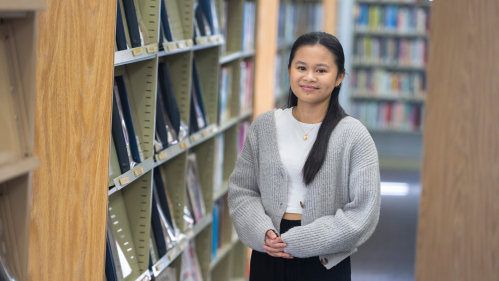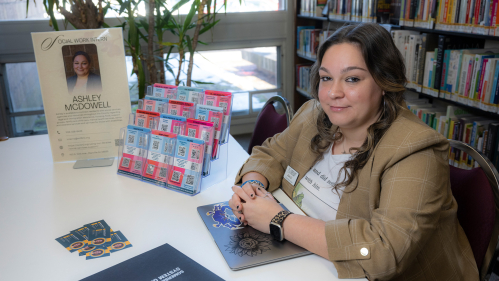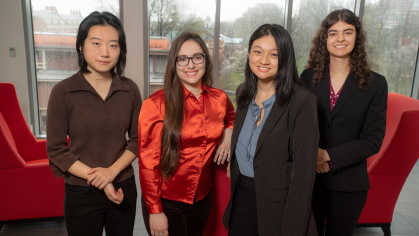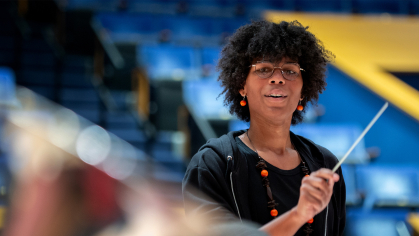Social Work Interns Find a World of Need in Public Libraries

When Sofia Lorraine Mico learned that she would be assigned to the Edison Public Library for her senior internship, she didn’t understand why a library would need a student majoring in social work.
Yet within a few weeks, the Rutgers senior found herself helping a woman who walked into the library looking for a homeless shelter. A deaf man living in a hotel asked where he could find an apartment that accepted federal housing vouchers. And a woman who is not a native English speaker couldn’t fill out an application for benefits.
Her opinion about whether social workers should work in libraries began to change. “We provide certain resources that sometimes our librarians can’t because you have to really do a deep dive into what that person really needs,” she says. “And the librarians may not have the time.”
With public libraries shifting into community centers that offer social service resources, Rutgers launched a program this year to place social work interns in libraries across central New Jersey. The program followed a trend among municipal libraries in the state to bring social workers on staff to work with patrons requesting social services.
“The role of libraries has changed pretty significantly over the last 20 years,” says Jen Nelson, the New Jersey State Librarian. Checking out books, she adds, “is not the purpose of libraries anymore. Libraries are really about connecting and improving communities, and working with individuals to do that.”

After a planning committee set up by the New Jersey State Library recommended that Rutgers develop the internship program, eight libraries in Somerset and Middlesex counties requested a senior majoring in social work or a graduate student earning a master of social work degree. The New Jersey State Library allocated about $150,000 for the program, which covers the interns’ stipends, Nelson says.
The interns are not only learning how to interact with people with a wide range of needs, but they are also helping libraries address social service needs in their communities, says Nancy Schley, associate director of practicum learning for the Rutgers School of Social Work.
“When students enter into a setting, they are eager to learn and they are eager to participate,” Schley says. “So it helps to invigorate the library staff in terms of what’s possible.”
After finding that many patrons were asking about housing, alumna Agny Valle, who will complete her master’s degree in social work this spring, created a bilingual workshop on affordable housing at the New Brunswick Free Public Library that offered information on tenant’s rights. She has also drawn on her own experience as a child of Mexican immigrants to help Spanish-speaking patrons, including a woman who needed assistance filling out applications for a job, an apartment and Medicaid.
“It was very rewarding to be able to speak in Spanish and let her know that I understand where she’s coming from, especially because my family members have had similar experiences,” she says.

The interns have discovered that many patrons who need services are often reluctant to approach them for help. The libraries, however, have promoted the program by posting flyers about the interns in their lobbies and placed signs at the interns’ desks.
One group of people that can be difficult to work with are the homeless, Mico says. “When the temperatures are dropping, a lot of unhoused people are in the library,” she says. “But the thing is, as much as I want to, I can’t help them unless they want my help.”
Rutgers senior Ashley McDowell found a way to start conversations with patrons at the Manville Public Library by creating sets of resource cards with QR codes that link to community resources, such as rehabilitation centers or support groups. She says she has designed “a card for any kind of problem that anyone might face.”
For McDowell, working in the Manville library has changed her plans for a career in social work. She initially thought she would specialize in the field of substance abuse, but she says the internship opened her up to other career paths.
“After being at the library, I realize there are so many other things that I could be doing with my social work degree other than substance abuse,” she says. “You can use a degree in social work for so many different things, and that’s what I’ve learned working at the library.”


